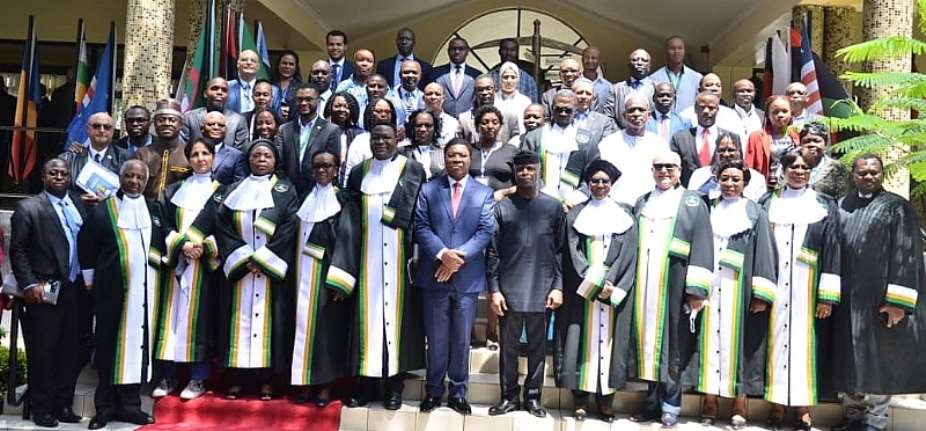Tanzania has reiterated its commitment to the African Court on Human and People’s Rights ideals and core values of human rights, good governance, democracy, and rule of law and our conviction and support for African institutions.
Prime Minister of Tanzania, Kassim Majaliwa Majaliwa, reaffirmed that Tanzania will not renege on its commitment to support and continue its obligations as the host country in strengthening the existing cooperation with the African Union.
Prime Minister Majaliwa stated during the opening of the Judicial Year of the African Court, monitored by the Communication for Development and Advocacy Consult (CDA Consult) in Tema as he explained that the jurisprudence of the Court over the past 15 years has demonstrated a clear path in the realization of Africa we want.
African Court Legal Year is a judicial ritual to mark the official commencement of the year. It is a significant manifestation and an opportunity to take stock of what has been achieved and address the challenges of the Court.
The African Court judicial year was on the theme: “The African Court and the Africa we Want”. It was attended by Professor Yemi Osinbajo, Vice President of Nigeria; Lady Justice Iman Daud Aboud, President of the African Court; Judges of the African Court and cross-section of Judges and Lawyers across Africa.
The Tanzanian Prime Minister acknowledged that the African Court has delivered landmark judgments on a wide range of issues covering civil and political rights, economic social, and cultural rights as well as group rights.
“As a result, it has resolved many disputes at national, sub-regional and continental level, thus encouraging regional integration, and harmonized African Union law.
“These achievements have been orchestrated by accountable and trusted people who have dedicated themselves to stand for and champion for achievements of human rights in the Continent.
“I know the performance of the African Court is not free from scepticism and criticism of some stakeholders, especially the Member States of the African Union.
“This has even led some of the States to withdraw their Declarations under Article 34 (6) of the Protocol establishing the Court. This is a clear signal to the Court that in the discharge of its mandate, it must exercise it in good faith, not abusing the trust bestowed upon it and also be mindful of the internal legal processes of member states,” he said.
Prime Minister Majaliwa said, “we have an obligation to aspire and strengthen an Africa of good governance, democracy, respect for human rights, justice and the rule of law”.
He said, “the main goals of this aspiration are to entrench democratic values, practices, universal principles for human rights, justice, and rule of law; and put in place capable institutions and transformed leadership in place at all levels”.
He said the judiciary as the paramount, and cornerstone in the field of Economic and Social Development must be seen to be at the forefront, stressing the African Court has a very important role to play in the realization of Agenda 2063 and the Africa we want.
Lady Justice Aboud reiterated the mission of the African Court which is to enhance through judicial decisions, the protective mandate of the African Commission by strengthening the human rights protection system in Africa.
She said the long-term vision is ‘an Africa with a viable human rights culture’ This vision is very informative because it states that it is only by establishing and upholding a feasible human rights culture, that we can comprehend and attain the Africa we Want”.
Source: CDA Consult





 We’ll protect state wealth from opaque deals – Prof Jane Naana
We’ll protect state wealth from opaque deals – Prof Jane Naana
 Mauritania president says running for second term in June polls
Mauritania president says running for second term in June polls
 I won't ever say I was a mere driver’s mate' — Prof. Opoku-Agyemang
I won't ever say I was a mere driver’s mate' — Prof. Opoku-Agyemang
 2024 polls: 'EC struggling to defend credibility'— Prof. Opoku-Agyemang
2024 polls: 'EC struggling to defend credibility'— Prof. Opoku-Agyemang
 Akufo-Addo gov't's 'greed, unbridled arrogance, unrestrained impunity, sheer dis...
Akufo-Addo gov't's 'greed, unbridled arrogance, unrestrained impunity, sheer dis...
 Election 2024: Ghana needs an urgent reset, a leadership that is inspiring – Ma...
Election 2024: Ghana needs an urgent reset, a leadership that is inspiring – Ma...
 Partner NDC to rollout a future of limitless prospects – Prof Jane Naana Opoku-A...
Partner NDC to rollout a future of limitless prospects – Prof Jane Naana Opoku-A...
 NPP will remain in gov’t till Jesus comes — Diana Asamoah
NPP will remain in gov’t till Jesus comes — Diana Asamoah
 Sunyani Technical University demands apology from former SRC president over sex-...
Sunyani Technical University demands apology from former SRC president over sex-...
 'Dumsor' was resolved by Mahama but ‘incompetent' Akufo-Addo has destroyed the g...
'Dumsor' was resolved by Mahama but ‘incompetent' Akufo-Addo has destroyed the g...
